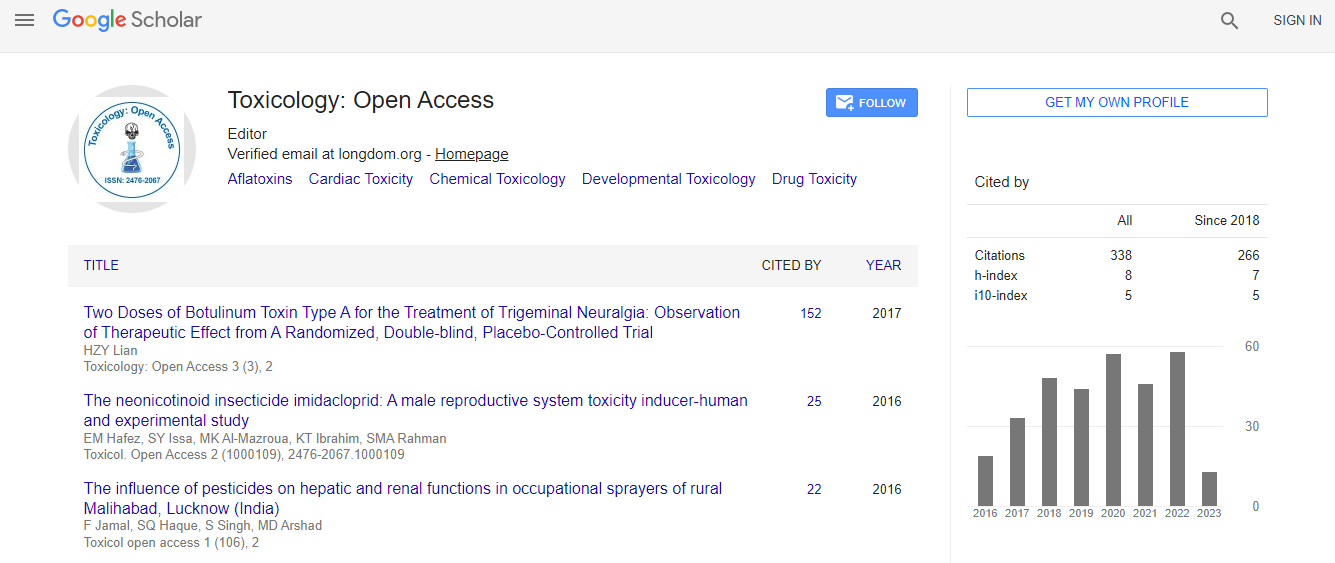Our Group organises 3000+ Global Conferenceseries Events every year across USA, Europe & Asia with support from 1000 more scientific Societies and Publishes 700+ Open Access Journals which contains over 50000 eminent personalities, reputed scientists as editorial board members.
Open Access Journals gaining more Readers and Citations
700 Journals and 15,000,000 Readers Each Journal is getting 25,000+ Readers
Google Scholar citation report
Citations : 336
Toxicology: Open Access received 336 citations as per Google Scholar report
Indexed In
- Google Scholar
- RefSeek
- Hamdard University
- EBSCO A-Z
- Geneva Foundation for Medical Education and Research
- Euro Pub
- ICMJE
Useful Links
Related Subjects
Share This Page
Inspiration from nature: Far-reaching impact of toxin research
14th World Congress on Toxicology and Pharmacology
R Manjunatha Kini
National University of Singapore, Singapore
Keynote: Toxicol Open Access
Abstract
Mankind has drawn inspiration from nature to help resolve various situations. Examining nature has aided in the development of almost every aspect of our lives - from buildings and bridges to materials and medicine. We benefit from these nature├ó┬?┬?s revelations several times a day and often without realization. Venomous animals are found throughout the phylogenetic tree. Venoms and toxins have evolved to assist them in the immobilization of prey and food capture as well as keeping the predators and competitors away. At the first glance, venomous animals, their venoms and toxins appear as villains and detrimental to you and your community. Despite their deadly, debilitating and harmful effects, a significant number of toxins have contributed to the development of (a) life-saving drugs; (b) diagnostic agents; and (c) research tools. In addition, they contribute to understanding fundamentals of chemistry, folding and evolution of proteins. Thus, over the last several decades, toxin research has contributed significantly to both basic and applied sciences. We have been interested in structurefunction relationships, mechanism of action and evolution of protein toxins. In this talk, I will highlight the impact of toxin research to our daily lives. Recent Publications 1. Sridharan S, Kini R M (2018), R. M.: Decoding the molecular switches of natriuretic peptides which differentiate its vascular and renal functions. Biochem. J; 475: 399-413. 2. Iyer J K, Koh C Y, Kazimirova M, Roller L, Jobichen C, Swaminathan K, Mizuguchi J, Iwanaga S, Nuttall P A, Chan M Y, Kini R M (2017) Avathrin: A novel thrombin inhibitor derived from a multi-copy precursor in the salivary glands of the ixodid tick, Amblyomma variegatum. FASEB Journal; 31: 2981-2995. 3. Sridharan S, Kini R M (2015) Tail wags the dog: activity of krait natriuretic peptide is determined by its C-terminal tail in a natriuretic peptide receptor-independent manner. Biochem. J; 469: 255-266. 4. Varuna H P, Adams D J, Kini R M (2015) A distinct functional site in omega-neurotoxins: Novel antagonists of nicotinic acetylcholine receptors from snake venom. ACS chemical biology; 10: 2805-2815. 5. Chen W, Carvalho L P, Chan M Y, Kini R M, Kang T S (2015) Fasxiator, a novel factor XIa inhibitor from snake venom, and its site-specific mutagenesis to improve potency and selectivity. J. Thrombos. Haemost; 13: 248-261.Biography
Professor Manjunatha Kini conducts basic and applied research on snake venoms and saliva of blood-feeding animals, both contain pharmacologically-active proteins. He is an accomplished biochemist and established world leader in the field of toxins as well as in blood clotting (thrombosis and hemostasis). His main research focus is "From Toxins to Therapeutics", where he identifies novel bioactive proteins from venoms or saliva, determines their modes of action, and designs potential drug-leads based on their structure. Venom toxins target cardiovascular and neuromuscular systems. He has published 240 research publications including 182 original articles, 40 reviews and 18 book chapters. In addition, he also filed 50 patent applications. He edited two monographs “Venom Phospholipase A2 Enzymes: Structure, Function and Mechanism” (Sole editor, 1997, John Wiley, England) and “Toxins and Hemostasis: From Bench to Bedside” (Chief Editor, 2010, Springer, The Netherlands). He also edited five special issues for various journals.
Email:dbskinim@nus.edu.sg

 Spanish
Spanish  Chinese
Chinese  Russian
Russian  German
German  French
French  Japanese
Japanese  Portuguese
Portuguese  Hindi
Hindi 